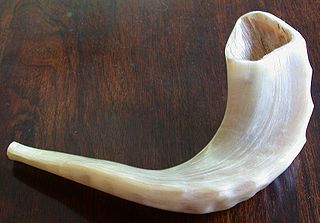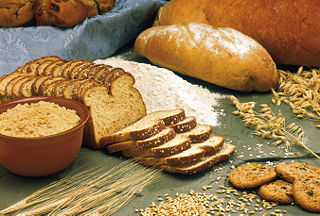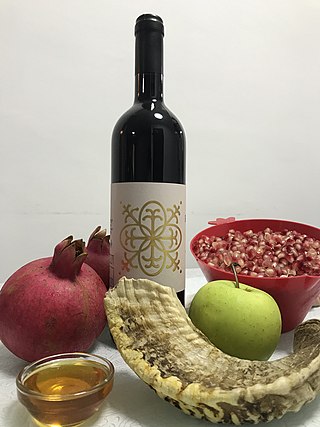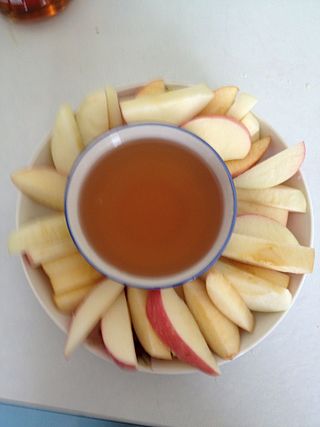Related Research Articles

In Judaism, the High Holy Days, also known as High Holidays or Days of Awe consist of:
- strictly, the holidays of Rosh Hashanah and Yom Kippur ;
- by extension, the period of ten days including those holidays, known also as the Ten Days of Repentance ; or,
- by a further extension, the entire 40-day penitential period in the Jewish year from Rosh Chodesh Elul to Yom Kippur, traditionally taken to represent the forty days Moses spent on Mount Sinai before coming down with the second ("replacement") set of the Tablets of Stone.

Selichot are Jewish penitential poems and prayers, especially those said in the period leading up to the High Holidays, and on fast days. The Thirteen Attributes of Mercy are a central theme throughout these prayers.

Challah is a special bread of Ashkenazi Jewish origin, usually braided and typically eaten on ceremonial occasions such as Shabbat and major Jewish holidays. Ritually acceptable challah is made of dough from which a small portion has been set aside as an offering. Challah may also refer to the dough offering. The word is biblical in origin, meaning "loaf". Similar braided breads such as kalach and vánočka are found across Central and Eastern Europe.

Jewish cuisine refers to the worldwide cooking traditions of the Jewish people. During its evolution over the course of many centuries, it has been shaped by Jewish dietary laws (kashrut), Jewish festivals and holidays, and traditions centred around Shabbat. Jewish cuisine is influenced by the economics, agriculture, and culinary traditions of the many countries where Jewish communities have settled and varies widely throughout the entire world.

Gribenes or grieven is a dish consisting of crisp chicken or goose skin cracklings with fried onions.

Birkat Hamazon, known in English as the Grace After Meals, is a set of Hebrew blessings that Jewish law prescribes following a meal that includes at least a kezayit (olive-sized) piece of bread. It is understood as a mitzvah based on Deuteronomy 8:10.

Sephardic Jewish cuisine is an assortment of cooking traditions that developed among the Sephardi Jews.

Israeli cuisine primarily comprises dishes brought from the Jewish diaspora, and has more recently been defined by the development of a notable fusion cuisine characterized by the mixing of Jewish cuisine and Arab cuisine. It also blends together the culinary traditions of the various diaspora groups, namely those of Middle Eastern Jews with roots in Southwest Asia and North Africa, Sephardi Jews from Iberia, and Ashkenazi Jews from Central and Eastern Europe.

Rosh HaShanah is the New Year in Judaism. The biblical name for this holiday is Yom Teruah. It is the first of the High Holy Days, as specified by Leviticus 23:23–25, that occur in the late summer/early autumn of the Northern Hemisphere. Rosh Hashanah begins ten days of penitence culminating in Yom Kippur, as well as beginning the cycle of autumnal religious festivals running through Sukkot which end on Shemini Atzeret in Israel and Simchat Torah everywhere else.

Mizrahi Jewish cuisine is an assortment of cooking traditions that developed among the Jews of the Middle East, North Africa, Asia, and Arab countries. Mizrahi Jews have also been known as Oriental Jews.

The Seder for the night of Rosh Hashanah is the Jewish tradition of eating a festive meal composed of symbolic foods, reciting psalms, and singing zmirot.

Chraime is a spicy fish stew with tomatoes from Northern Africa. The name of the dish comes from the Arabic word for "hot".
Ethiopian Jewish cuisine is the cuisine of the Beta Israel. The cuisine of the Ethiopian Jews is similar to the cuisine of other Ethiopians, with some variations.

Brisket is a popular Ashkenazi Jewish dish of braised beef brisket, served hot and traditionally accompanied by potato or other non-dairy kugel, latkes, and often preceded by matzo ball soup. It is commonly served for Jewish holidays such as Hanukkah, Passover, Rosh Hashanah, and Shabbat. It is commonly found in Jewish communities worldwide, though it is most commonly associated with Jews in the United States, where it has been considered the most important and iconic Jewish main course since the early 20th century.

Ashkenazi Jewish cuisine is an assortment of cooking traditions that was developed by the Ashkenazi Jews of Central, Eastern, Northwestern and Northern Europe, and their descendants, particularly in the United States and other Western countries.

Duvshaniot, also known as honey buttons, is a popular Israeli cookie made with honey and spices that is traditionally made to celebrate Rosh Hashanah and the High Holidays.

Apples and honey is a traditional dish served by Ashkenazi Jews on Rosh Hashanah, the Jewish New Year's Day and the beginning of the High Holidays.
Pain petri is a braided bread of Moroccan Jewish origin, that is traditionally baked for Shabbat, the Jewish sabbath, as well as Rosh Hashanah and other Holidays, and is popular among the Moroccan Jewish community of Morocco, France, and Israel.
Boulou, also known as boulous, is a Libyan Jewish sweet bread or cake of Maghrebi Jewish origin, similar to mouna, tishpishti, or pound cake, that is traditionally made into loaves or rolls and consumed as part of the meal preceding the Yom Kippur Fast, or as part of the break fast that follows. It is most commonly found today in France, and Israel. Boulou has a sweet taste enriched with sugar, eggs, honey, oil, and golden raisins it often contains seeds such as fennel, sesame, and nigella seeds.
New Year's foods are dishes traditionally eaten for luck in the coming year. Many traditional New Year dishes revolve around the food's resemblance to money or to its appearance symbolizing long life, such as long noodles or strands of sauerkraut. Sweets, symbolizing a sweet new year, are often given or consumed. Some cultures and religions have evolved complex food traditions associated with the new year.
References
- ↑ "Ethiopian, Yemeni or Ashkenazi? Traditions Behind Rosh Hashanah Breads". Ha’aretz. Retrieved 3 October 2019.
- ↑ "PASI-tively Delicious!". JUF.org. Retrieved 3 October 2019.